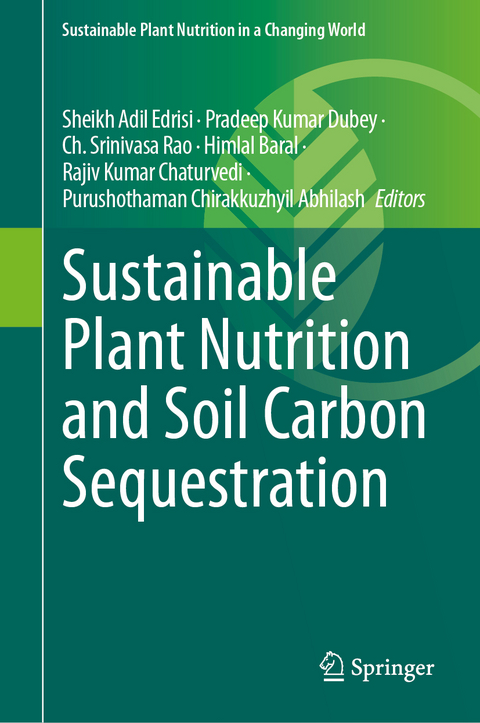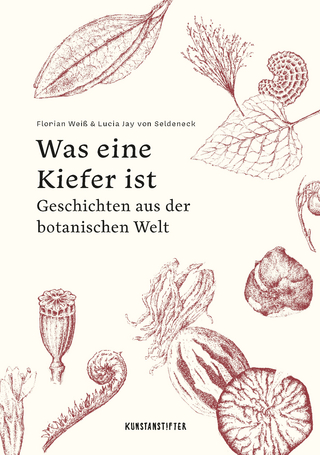
Sustainable Plant Nutrition and Soil Carbon Sequestration
Springer International Publishing (Verlag)
978-3-031-53589-5 (ISBN)
Terrestrial plant systems are an integral part of Earth's land resources. Resources are mutually connected via the nutrient exchange phenomena. Thus, plant nutrition is crucial in managing soil fertility and land productivity. Soil organic carbon is one of the critical indicators for assessing the viability of land, and hence soil carbon sequestration, which is a burgeoning issue regarding changing climatic conditions.
In this context, this book provides an essential linkage between sustainable plant nutrition and soil carbon sequestration and their management strategies that lead to multidimensional benefits for environmental sustainability. The primary purpose of this book is to explore the nexus between carbon sequestration and plant growth, its role in maintaining ecosystem services, and modeling aspects of soil carbon and nutrient dynamics. Moreover, it aims to address the growing challenges of ecological perturbations, unraveling the potential of degraded lands for food, fuel, and nutritional security, and accounting for meeting various UN SDGs.
Dr. Sheikh Adil Edrisi is an Assistant Professor at the Thapar School of Liberal Arts and Sciences at TIET, Patiala, India. He earned his MPhil and PhD from Banaras Hindu University in Varanasi, India. He is researching to restore degraded lands for multipurpose environmental benefits; exploring the role of GIS to assess land productivity; bioremediation of contaminated and degraded lands for efficient bioenergy production; biodiversity conservation and restoration by developing an apposite policy framework for attaining key UN Sustainable Development Goals (UN SDGs). He has received the 2021 Early Career Start-up Research Grant from SERB, Govt. of India, the 2019 Green Talents Award from the BMBF in Germany, and the NASI-Springer Award (2018) from NASI, India. Additionally, he holds editorial roles in reputed journals in the area of land degradation, restoration, and sustainable production such as Energy, Ecology and Environment, Anthropocene Science (Springer), Restoration Ecology, Land Degradation and Development (Wiley), and PLoS-One (PLoS). Dr. Adil is also the 'initial member' of Global Soil Biodiversity Initiatives and is currently an active IUCN-CEM, CEESP, and CEC commission member to resolve pressing global challenges of land restoration and sustainable development.
Dr. Pradeep Kumar Dubey is Program Manager within Sustainable Landscape and Restoration program at World Resource Institute India (WRI India). His primary area of expertise lies in agroecosystem management following bottom-up approach, and currently focus on landscape restoration in Maharashtra, India. Pradeep holds MSc-PhD degree in Environmental Science from Banaras Hindu University, Varanasi, India. He has undertaken substantial agricultural surveys and field level experimental validation, proposing various ecological solutions for agri-environmental sustainability, land-soil management within the Vindhyan dryland and Gangetic Plain in eastern UP, India. Dr. Dubey is selected IPBES fellow for Nexus assessment, fellow of the Society for Plant Research in India, recipient of the IUCN CEM Agroecosystems Special Recognition Award and Young Scientists Award from the Society for Science of Climate Change and Environmental Sustainability. He serves as member for IUCN commissions (CEM, CEC, CEESP), Global Land Program (GLP), Global Soil Biodiversity Initiative (GSBI), and is invited as resource person, expert, or speaker in various state, national and international forums. He published research, reviews, opinions, editorial pieces, book chapters, and a lead-authored book. He has been actively involved in editorial and reviewer roles for esteemed international journals.
Dr. Cherukumalli Srinivasa Rao acquired his Ph.D. in Soil Science and Agricultural Chemistry from IARI, New Delhi, and Post-Doctoral (Fellow) from Tel-Aviv University, Tel-Aviv, Israel. Dr. Rao worked in ICAR system in different capacities from Scientist to Director. Currently, he is serving as Director, ICAR-National Academy of Agricultural Research Management, Hyderabad since 2017. He also served the International Crop Research Institute for Semi-Arid Tropics (ICRISAT), Patancheru, Hyderabad for 3 years. He is the recipient of 40 national and international awards which include the Rafi Ahmed Kidwai Award for Outstanding Research in Agricultural Sciences, 2019. He contributed to the UNFCCC global climate change negotiator in agriculture sector from Government of India. Dr. Rao is the Fellow of the Indian National Science Academy, National Academy of Sciences, National Academy of Agricultural Sciences; and Member of various National and International Committees globally. Dr. Rao is specialized in Climate Change, Soil Carbon Sequestration, Carbon Balance, Dryland Production Systems, and Climate Policy. Dr. Rao is credited with 340 Research Papers, 50 Books authored/edited, 14 copyrights, 21 Policy/Strategy/Status Papers. H
Preface.- Carbon sequestration via plant nutrition management: Processes and mechanisms.- Drivers of soil organic carbon loss under changing climate.- Exploring nexus between soil carbon sequestration and plant growth.- Role of carbon sequestration in maintaining ecosystem services.- Remote sensing and modelling soil organic carbon sequestration: A regime in global climate change.- Models for soil carbon and nutrient turnover: current status, trends and future prospects.- Modelling plant growth, nutrition and dynamics of soil organic carbon under changing climate and land use change.- Carbon footprinting and life cycle assessment under various plant growth models.- Ecological perturbations and loss of soil organic carbon: Impacts and challenges of mitigation strategies.- Unravelling the carbon capture potential of degraded lands via tree plantations and land restoration.- Comparative role of topsoil and subsoil organic carbon in plant nutrition under climate change.- Enhanced soil carbon storage for improved crop productivity assuring sustainable food and nutritional security.- Enhancing plant nutrition and carbon sequestration via different agroforestry approaches.- Impact of various agronomic approaches on nutrient use efficiency.- Exploring root engineering technologies for efficient nutrient uptake in plant systems.- Role of novel microorganisms for maintaining soil carbon pool and plant health.- Advanced molecular approaches for sustainable soil nutrient management and improving ecosystem services.- Linking plant nutrition to 'zero hunger' (SDG# 2) and other associated SDGs.- Linking carbon sequestration to UN-SDGs.- Global and regional sustainability challenges and undertaken initiatives for plant and soil nutrient management.- Bibliography.- Index.
| Erscheinungsdatum | 12.11.2024 |
|---|---|
| Reihe/Serie | Sustainable Plant Nutrition in a Changing World |
| Zusatzinfo | XXIV, 365 p. 70 illus., 61 illus. in color. |
| Verlagsort | Cham |
| Sprache | englisch |
| Maße | 155 x 235 mm |
| Themenwelt | Naturwissenschaften ► Biologie ► Botanik |
| Naturwissenschaften ► Biologie ► Ökologie / Naturschutz | |
| Schlagworte | Carbon Sequestration • Environmental sustainability • global climate change • Nutrient dynamics • Plant nutrition |
| ISBN-10 | 3-031-53589-8 / 3031535898 |
| ISBN-13 | 978-3-031-53589-5 / 9783031535895 |
| Zustand | Neuware |
| Informationen gemäß Produktsicherheitsverordnung (GPSR) | |
| Haben Sie eine Frage zum Produkt? |
aus dem Bereich


